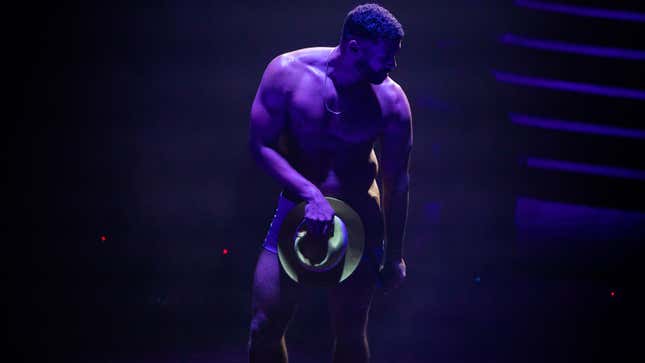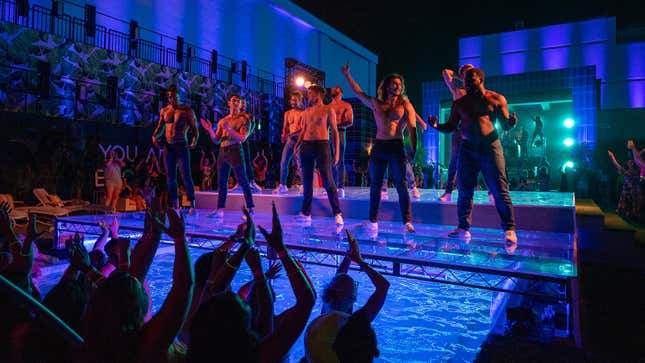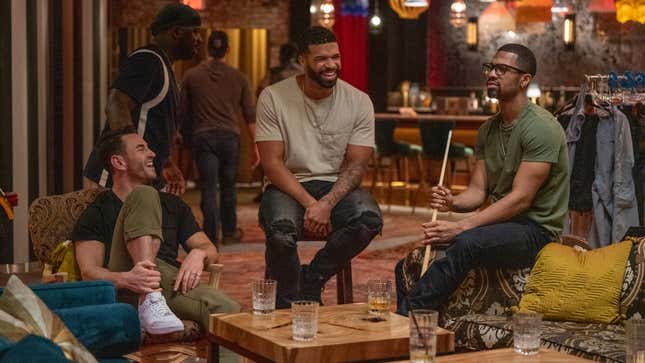Finding Magic Mike: Try a Little Himbo Tenderness
The new HBO reality show, which is adjacent to the Las Vegas live show, builds guys up to break down what it means to be a man
EntertainmentTV

For a show that trades in brawn and men’s gyrating crotches, Magic Mike Live is actually pretty clever. The 90-minute spectacle, which has played in Las Vegas since 2017 and is currently at the Sahara hotel casino, repeatedly subverts the expectations it sets by virtue of being an all-male revue. I almost hesitate to print its first trick, because experiencing it without knowing a thing about it going into it was enough to make my head spin when I watched the show Saturday. Set in the round (the stage is more like a boxing ring than anything), Magic Mike Live begins with a lineup of dudes on the stage in typically “manly” costumes (a fighter fighter, a cop, a dude in a tuxedo shirt with its sleeves cut off) while an MC motormouths obscenities. He reminded me of Henrietta ‘Mama’ Bazoom in Showgirls (“Did someone just stick their finger in my ass?” was his idea of a joke). The dancers start to infiltrate the audience, grinding on various women, hard. I saw one yank a woman’s chair with such force from behind that I was surprised she didn’t hit the floor. He proceeded to climb onto her and then force her onto the stage. The look on her face was so scared and disoriented, I thought she might be on heavy drugs. I was terrified for her.
And then the stage went dark, a spotlight shone on her, and she delivered a monologue to an invisible unicorn in the sky. Twist! This wasn’t the show she wanted, so could she maybe steer the ship? The bait and switch resulted in her taking over as MC, guiding us through a show that’s wall-to-wall packed conventionally attractive men of varying backgrounds (though the body fat percentage is uniformly low, and their ages don’t appear to cross 40). It’s a gentler spin on the pecs-and-ass showcases that help define the Strip’s entertainment, and rather self-consciously so. There’s a better way, says Magic Mike Live, and then it shows how.
Fittingly, Finding Magic Mike, the new HBO Max reality competition, is as much a formal response as the live show it’s associated with. It puts 10 finalists who’ve “lost their magic” through a bootcamp of sorts inspired by various elements of the Magic Mike Live show. Their ultimate prize is not to join the company of the live show, but $100,000 and something a bit more ephemeral: personal growth.
Showrunner Alycia Rossiter said during a recent junket in Vegas that she went into her first meeting with series producers Peter Kiernan and Vince Marini (who also produces the live show and mentors on the reality show), knowing that she was not interested in helping them search for America’s Next Top Himbo Stripper.“I came to [the producers] with a take of: In the post-MeToo era, let’s talk about what it means to be a man and what is sexy,” explained Rossiter. “A lot of men have the wrong perception of what women want from them. And we’re going to sort of teach them about communication and about being soft and about all of the things that make, I think, a man in 2022 a man.”
“Dance was the vehicle, but we weren’t looking for the best dancer,” added Alison Faulk, who choreographs Magic Mike Live and the guys on the TV show.

While it may seem circuitous, if not outlandish, to train men moves like the dolphin dive and kip-up with no plans to actually hire them to perform them onstage, there’s some precedence to the benefits of the Magic Mike process—the show’s host and mentor Adam Rodriguez, who played Tito in the Magic Mike movies, said the experience of dancing nearly nude in front of the world was actually useful in the bigger scheme of his life. “I knew how much I grew from the experience of doing the movies—pushing past my own vulnerabilities and my own hesitations about body or dancing in a G-string,” he said. “Just doing things that like would have seemed like the scariest thing in the world at one moment. And when you push past them and then have the experience and realize what’s beyond the fear, you know, you’re like, Oh, fuck, I got to help other people get there too and see what’s beyond this.”
Finding Magic Mike filmed in July and August of 2021 for about eight weeks. To maintain the show’s covid bubble, the contestants were sequestered in separate hotel rooms when they weren’t practicing or performing.
“I think the toughest thing mentally was probably being locked away in a room and not being able to have like my freedom that I wanted,” said contestant Nate Bryan, 32.
-

-

-

-

-

-

-

-

-

-

-

-

-

-

-

-

-

-

-

-

-

-

-

-

-

-

-

-

-

-

-

-

-

-

-

-

-

-

-

-









































